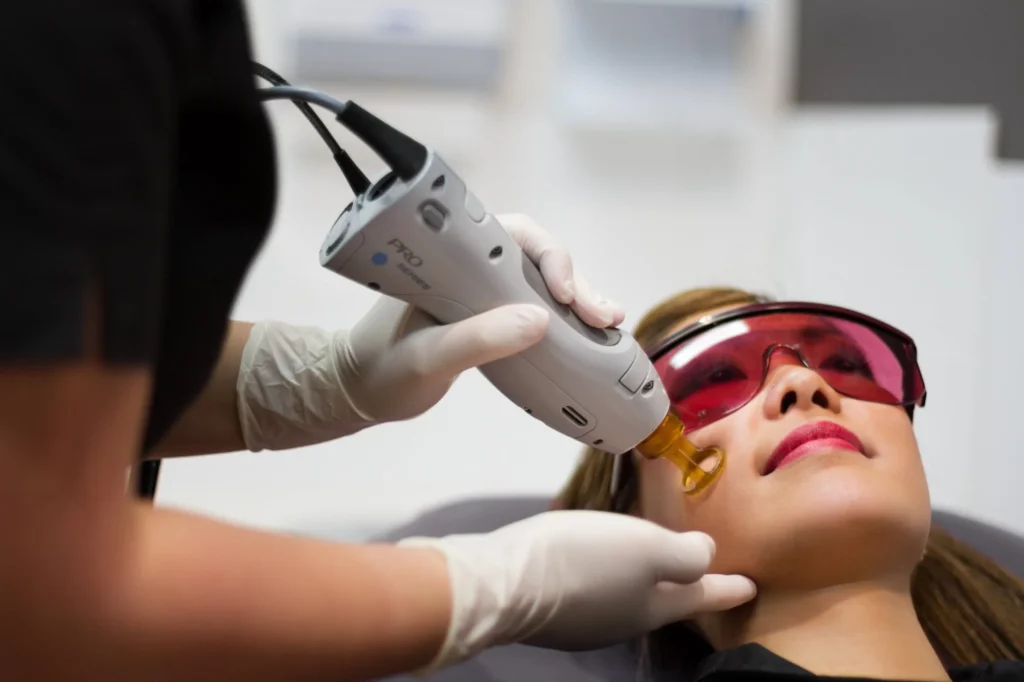Hyperpigmentation, characterized by dark patches and uneven skin tone, is a common skin concern that affects many individuals. Traditional treatments can sometimes be ineffective or slow to show results, leading to frustration. This brings us to the question: “Does Laser Hair Removal Help With Hyperpigmentation?” Surprisingly, laser hair removal, primarily known for its ability to reduce unwanted hair, has shown promise in addressing hyperpigmentation as well. By delving into the science and effects of laser technology, we can uncover how it might be a dual-purpose solution, offering both hair removal and a more even skin tone, helping you achieve the clear, radiant skin you desire.
What is Laser Hair Removal?
Let’s start with the basics. Laser hair removal is a popular cosmetic procedure that uses concentrated beams of light (laser) to remove unwanted hair. It’s loved for its precision and long-lasting results, making it a go-to for those tired of the constant cycle of shaving, waxing, or tweezing.
But how does it work, you ask? The laser targets the pigment (melanin) in the hair follicle, heating it up and damaging it enough to inhibit future hair growth. Over several sessions, this process can lead to a significant reduction in hair growth, with some lucky folks even achieving permanent hairlessness in the treated areas.
Understanding Hyperpigmentation
Now, let’s talk about hyperpigmentation. This term refers to patches of skin that become darker than the surrounding area. It occurs when an excess of melanin, the pigment that gives skin its color, forms deposits in the skin. Hyperpigmentation can be triggered by a variety of factors, including sun exposure, inflammation, acne, and certain medications.
Common types of hyperpigmentation include:
- Sunspots (Solar Lentigines): Often caused by prolonged sun exposure.
- Post-inflammatory Hyperpigmentation: Dark spots that appear after an injury or inflammation, such as acne.
- Melasma: Often associated with hormonal changes, like those during pregnancy or from taking birth control pills.
The Connection Between Laser Hair Removal and Hyperpigmentation
So, where does laser hair removal fit into the hyperpigmentation puzzle? There’s a common belief that laser treatments, including laser hair removal, can improve hyperpigmentation. But is it true? Let’s break it down.
How Laser Hair Removal Can Affect Hyperpigmentation
- Targeting Melanin: As mentioned earlier, laser hair removal works by targeting melanin in hair follicles. Interestingly, this process can also influence melanin in the skin, potentially affecting hyperpigmentation. The laser’s heat can sometimes help break up pigment particles in the skin, which might reduce the appearance of dark spots over time.
- Reducing Inflammation: For individuals with post-inflammatory hyperpigmentation, reducing the underlying inflammation is key. Laser hair removal can sometimes help by reducing the irritation caused by shaving or waxing, which might otherwise contribute to further pigmentation issues.
- Stimulating Skin Renewal: Laser treatments can stimulate collagen production and skin renewal, promoting a more even skin tone. This rejuvenation process can help fade hyperpigmented areas gradually, especially when combined with other skincare treatments and a diligent sun protection routine.
Considerations and Precautions
While laser hair removal can offer benefits for hyperpigmentation, it’s not a guaranteed fix for everyone. Here are some important considerations:
- Skin Tone and Hair Color: The effectiveness of laser hair removal can vary based on skin tone and hair color. Traditionally, the treatment works best on individuals with fair skin and dark hair because the laser targets the contrast between the pigment in the hair and the skin. However, advancements in laser technology have made it possible for a wider range of skin tones and hair colors to benefit from the procedure. That said, people with darker skin tones need to be especially cautious, as they may be more prone to pigmentation changes following laser treatments.
- Risk of Hyperpigmentation: Ironically, laser hair removal itself can sometimes cause hyperpigmentation, particularly if the skin is not properly cared for before and after the treatment. This is why it’s crucial to choose a reputable clinic and a qualified practitioner who understands the intricacies of treating different skin types.
- Sun Protection: After laser hair removal, the skin can be more sensitive to sun exposure, increasing the risk of hyperpigmentation. Using a high-SPF sunscreen and avoiding direct sunlight on treated areas is essential to prevent new pigmentation issues from arising.
Are you curious about “Does Antibiotics Affect Laser Hair Removal?” Learn all about it on our blog page now!
Tips for Optimal Results
If you’re considering laser hair removal and are curious about its effects on hyperpigmentation, here are some tips to maximize your results:
- Consult a Professional: Always start with a consultation with a qualified dermatologist or laser specialist. They can assess your skin type and pigmentation concerns to tailor the treatment to your needs.
- Follow Pre- and Post-Treatment Care: Adhere to all the guidelines provided by your practitioner. This includes avoiding sun exposure, using recommended skincare products, and following any specific instructions regarding your treatment area.
- Combine Treatments: For those with significant hyperpigmentation, combining laser hair removal with other treatments like chemical peels, topical lightening agents, or microneedling might yield better results. Always seek professional advice before combining treatments.
- Patience is Key: Skin renewal and pigmentation reduction take time. Be patient and consistent with your treatments and skincare routine.
- Protect Your Skin: Sun protection cannot be stressed enough. Use a broad-spectrum sunscreen with at least SPF 30 every day, even if you’re not planning to spend much time outdoors.
Conclusion
So, does laser hair removal help with hyperpigmentation? The answer is a bit nuanced. While it can have positive effects, especially by reducing inflammation and stimulating skin renewal, it’s not a one-size-fits-all solution. Results can vary based on individual skin types, the cause of hyperpigmentation, and how well you care for your skin before and after treatments. If you’re considering laser hair removal and are concerned about hyperpigmentation, a personalized approach with professional guidance is your best bet. And remember, beautiful skin is a journey, not a destination. Keep exploring, stay informed, and embrace the process. Ready for smoother, clearer skin? Try laser hair removal at Roha MedSpa and see how our expert treatments can help reduce unwanted hair and hyperpigmentation. Book your appointment today and experience the transformation!







